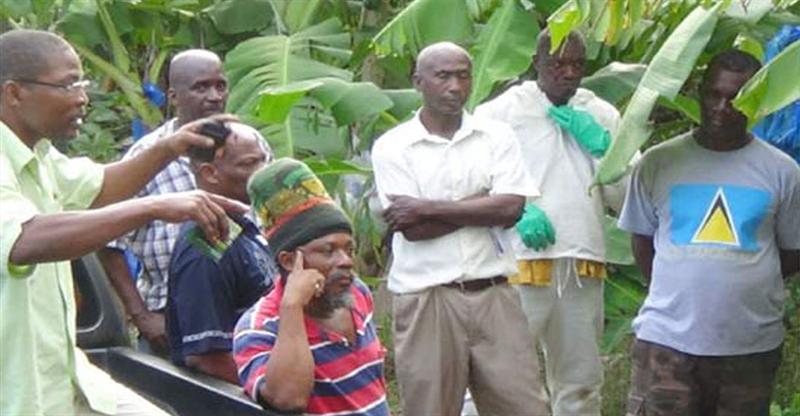The farm-based clinics will strengthen the capacity of commercial banana and plantain farmers, and farm operatives in managing the Black Sigatoka Disease.
 The Black Sigatoka Management Unit has almost completed a six-week series of farm-based training clinics island-wide.
The Black Sigatoka Management Unit has almost completed a six-week series of farm-based training clinics island-wide.
The training clinics will strengthen the capacity of commercial banana and plantain farmers, and farm operatives in an integrated approach to managing the Black Sigatoka Disease (BSD).
The initiative is part of a broader year-long capacity-strengthening program that began in April 2014, and targeted technical, laboratory and field personnel, farmers, farm workers and other key service providers in the banana industry.
The farm-based clinics serve as a follow-up to the regional BSD management workshops, and focused primarily on hands-on activities and demonstrations of integrated BSD management techniques.
The clinics targeted nearly 150 producers and farm operatives island-wide, and were conducted with clusters of farmers within close proximity to each other, thus allowing for maximum participation.
The main training elements focused on the visual identification of BSD in the field; best management practices; the benefits of the integrated pest and disease management approach; the appropriate and judicious use of agro-pesticides; strategic agri-diversification options with banana and plantain crops; and alternative agri-production systems.
Additional BSD interventions included a month-long training program held from May to June 2014 for technical, laboratory and field personnel; and a six-week customized professional training session for personnel of the Research and Development Division in collaboration with the Taiwan Banana Research Institute.
In September/October 2014 two laboratory personnel also pursued a 5-week specialized training stint in Taiwan, while in November/December 2014, four regional training workshops on integrated management of BSD were hosted throughout the island for banana and plantain farmers, related technical field officers, and personnel from producer organizations, Winfresh, Ministry of Agriculture and Food Production and field officers of the Black Sigatoka Management Unit.
Through this collective approach, farmers are better-placed to effectively manage BSD, while reducing the reliance on agro-pesticides. To date, 138 participants have been trained.